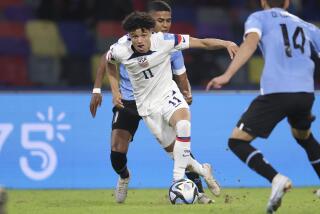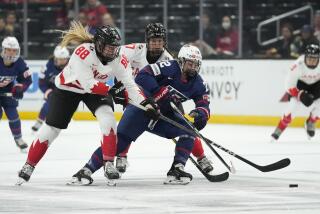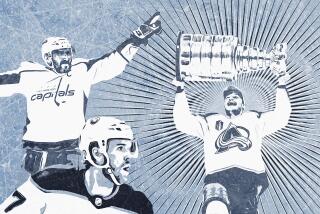PLACID LIFE
- Share via
Small lakes dot the northern woods of Minnesota, blue specks on the map, too many to count, and beside one of them Mark Pavelich lives happily ever after. Far from the sport of hockey that brought him acclaim. Far from the world and its commotion.
“Just the wild and his wife and his dog,” a friend says. “He moved out there for a reason.”
Once in a while, he visits the nearby town of Lutsen for groceries or someone spots him driving his truck on a back road, headed for a fishing spot perhaps. Few know the exact whereabouts of his cabin.
So when a reporter calls--after getting the unlisted number--Pavelich is polite but guarded. Mostly “ums” and “ahs” followed by silence. The conversation quickly moves to that night in Lake Placid, N.Y., against the Soviet Union, more than 20 years ago, when he collected the puck along the boards and slid it in front of the net.
“The past is the past,” he says.
That puck ended up on the stick of teammate Mike Eruzione, who scored to give the U.S. squad an upset over the USSR on the way to a gold medal at the 1980 Winter Olympics.
The “Miracle on Ice” still ranks among the nation’s greatest sporting moments and, in many ways, Pavelich was symbolic of the American team. An underdog because of his small frame. Selfless and hard working. Quietly fierce. In the years since, he has become something else: A mystery.
Some of his teammates have basked in the enduring spotlight, playing in celebrity golf tournaments, getting paid as motivational speakers. Others have kept in touch by phone, gathering in small groups for dinners or golf vacations, bonded by their experience. Pavelich has kept to himself.
The players now hope he will come to their biggest reunion yet. With the Winter Games back on American soil--and patriotism in vogue--they have been invited to play an exhibition Friday at Staples Center, the day before the NHL All-Star game. It will mark the first time in two decades all of them have gathered. All, perhaps, but one.
“We may have to send one of those drone planes or Global Positioning Satellites to find him,” former defenseman Ken Morrow says of Pavelich.
They might have to kidnap him.
“He’s not being aloof,” says Bill Baker, another former teammate. “You’ve just got to know Pav.”
Lutsen sits snug against Lake Superior, two hours north of Duluth, almost to the Canadian border. Even in this town, remote as it is, the man and his ways are noteworthy.
“People are always talking about him,” a local named Doc Rose says. “How’s he doing and what’s he doing.”
Rose is among the few who have been shown the way to Pavelich’s cabin a dozen miles off the highway. He is a retired trainer for the Minnesota North Stars--the NHL team that moved to Dallas--and has known Pavelich for years. He recalls when the player moved to Lutsen in the late 1980s after playing professionally in New York, of all places.
Pavelich bought a townhouse by the shore, but, as Rose explains, “he went into the bush as soon as he got a chance,” trading his home for a parcel of forest land, moving into a garage with only a couch to sleep on. From there, he set about building a cabin.
“One board at a time,” Rose says. “Nothing extravagant but well-built. And you’d have a heck of a time finding it.”
There is fishing in the lake outside his door and small game to hunt in the woods. Asked about his home, Pavelich says only that “there’s a lot of stuff to do other than hockey.”
Not that he’s a recluse. Several houses stand nearby. Friends who know the way are met with a friendly welcome and perhaps a fish dinner cooked on the outdoor grill. Still, the place is secluded enough that whenever Rose stops by, he feels as if he is intruding. And visitors, especially acquaintances from New York, come away wondering how Pavelich survives out there.
The question should be: How did he survive in the bright lights and big cities?
He was born in nearby Eveleth, in rugged country known as the Iron Range, where boys learn to hunt and fish from an early age. The town claims to have the world’s largest hockey stick at 107 feet long, so they also learn to play.
Pavelich was small for the game, never growing taller than 5 feet 8, but all those childhood days on outdoor rinks molded him into a clever skater and stickhandler. “A throwback player who could control the puck like he had it on a string,” says Baker, who grew up nearby in Grand Rapids.
In the late 1970s, those skills made Pavelich one of the greatest players in the history of the University of Minnesota Duluth. They subsequently earned him a spot on the Olympic team.
More than half of the American players and their coach, Herb Brooks, came from Minnesota. The others were from Wisconsin, Michigan and Massachusetts, sworn rivals on the ice. Yet from this group emerged a close-knit bunch, Pavelich playing the quiet one.
“I’ve known him since high school and he was always a man of few words,” Baker says. “You never know what he’s thinking.”
He earned respect with his work ethic and a knack for passing the puck. Former goaltender Jim Craig recalls him as “an honest man, just a wonderful guy to be around.”
Little was expected of the Americans that winter, their coach reportedly telling them before the Olympics it would take some luck to win a bronze. But after an opening tie against Sweden, they rolled to four consecutive victories against the likes of Norway and Romania to reach the medal round against the powerhouse Soviets.
Pavelich played an essential, supporting role that night, assisting on two of the four goals. Two days later, the U.S. defeated Finland to win the gold medal, and Pavelich wound up with six assists in the seven Lake Placid games.
The players became overnight heroes, appearing on television, visiting the White House, attending promotional events across the nation.
“A lot of commotion,” Pavelich says. “I tried to avoid it as much as possible.”
Then he signed with the New York Rangers and moved to Manhattan. The team photo shows a young man with shaggy hair and heavy features, his lips pressed together in only the faintest semblance of a smile. He claims to have enjoyed his time in New York, taking in the sights of the city, but teammates recall he wasn’t much for the nightlife.
“He’d rather do his job and be gone,” says Baker, who joined his pal in New York for a season. “He’d rather go to the corner bar, have a few beers and talk to the old-timers than go to Studio 54.”
On the ice, Pavelich scored 76 points as a rookie--still a team record--and led the Rangers the following season with 37 goals, five of them in a memorable game against the Hartford Whalers. Though such numbers surely established him in the league, he retired after only five seasons because of differences with a new coach.
There would be flickers of comebacks, a dozen or so games with the North Stars and San Jose Sharks, but his career was basically over.
“It was pretty easy,” he says. “I just stepped away from it.”
The players who reunite at Staples Center this weekend like to joke that Eruzione made a career of his historic goal. That includes two decades of working as a broadcaster, speaking at corporate meetings and playing in celebrity golf tournaments.
“When the Olympics ended, Mike and I ... thought we could have some fun with this for a year, maybe two,” his agent, Bob Murray, says. “In our wildest dreams we never thought he’d still be doing this.”
Craig, too, gets hired as a motivational speaker.
“It was more than a hockey game,” he says. “I’ve learned over the years how much this meant to people.”
But for Pavelich, those two weeks in Lake Placid seem distant. He describes himself as “kind of retired” and says a couple of years have passed since he last wore a pair of skates. Rose guesses he saved enough money from his playing days to live simply and comfortably, often fishing for his dinner. There is little need for nostalgia.
So he has skipped every reunion, large and small, save for the wedding of former teammate Steve Christoff. Even those players who live within a few hours’ drive of Lutsen say they have not seen him in years.
“I call him to see how he’s doing,” says Phil Verchota, now a bank executive in Willmar, Minn. “He’s just private. He doesn’t like social functions.”
His teammates hoped he would make an exception for a golf vacation they arranged in South Carolina two years ago. They left a plane ticket for him, and Baker, now an oral surgeon in Brainerd, Minn., arrived early at the airport, eager to talk about old times.
“I waited and waited but he never showed,” he says. “I had an empty seat beside me on the plane.”
This time, with an insurance company paying to bring the team to Los Angeles, Pavelich is noncommittal when asked if he will come. “Well, um ... we’ll see,” he says.
Verchota, who spoke to him recently, was doubtful.
The players say they will be disappointed if he does not attend, but also admit to getting a certain amount of enjoyment from his reticence. They joke about him being a hermit. They speculate about him chasing Bigfoot.
And, in more serious moments, they suspect he isn’t so mysterious after all.
“He could care less about the limelight,” Craig says. “He just lives his life and is happy ... all of us should be that courageous.”
More to Read
Go beyond the scoreboard
Get the latest on L.A.'s teams in the daily Sports Report newsletter.
You may occasionally receive promotional content from the Los Angeles Times.







